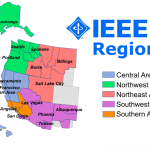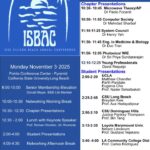Following article reposted from the IEEE San Fernando Valley Newsletter.
Getting to Know Kostek and Coughlin
Knowing where the candidates for IEEE Region 6 Director-Elect stand and what they offer is vital to deciding who you’ll vote for when you receive your ballot in August for the annual IEEE election. IEEE Region 6 has selected two candidates—Paul Kostek and Thomas Coughlin. Both candidates were asked to answer few questions as candidates for the IEEE San Fernando Valley Section (www.ieee-sfv.org).
Tell us a little bit about yourself
Kostek: I grew up in Massachusetts, graduated from University of Massachusetts Dartmouth and started my career at Grumman Aerospace on Long Island NY. Moved to Seattle 31 years ago to join the Boeing Company. Since leaving Boeing I’ve worked in the aerospace, defense, medical device and e-commerce industries. I’ve worked as a direct employee, contractor, and consultant. When not volunteering for IEEE I bike ride, enjoy wine collecting, golf, hanging with my wife and dogs on the Oregon Coast and reading. I’ve also run 14 marathons.
Coughlin: I am originally from the mid-West (South Dakota and Iowa). I have a BS Physics and an MSEE from the University of Minnesota and a PhD in Electrical Engineering from Shinshu University in Japan. I have lived in the MidWest, the East Coast (Boston) and in both Northern and Southern California.
I am president of Coughlin Associates, Inc., a consulting firm specializing in digital storage devices, systems and applications. My business consists of three basic activities. The first is technical conferences. I founded and organize the annual Storage Visions (SV) and Creative Storage (CS) Conferences. I have also been chairman of the annual Flash Memory Summit for 6 years. The second part of my business is publications. I publish several reports on an annual or biannual basis on digital storage and storage applications. I also publish a quarterly newsletter on digital storage technology. In 2008 Elsevier published a book I wrote called “Digital Storage in Consumer Electronics: The Complete Guide.” The third part of my business is technical and other consulting on digital storage devices, systems and applications. I have over 70 published papers, articles and reports on digital storage technology and I am an author on 6 patents.
Before starting my consulting business I worked for over 20 years for a number of companies as an engineer and high level technical manager on magnetic storage including floppy disks, magnetic tape drives and hard disk drives. Companies that I worked at include Ampex, Seagate Technology, Maxtor, Micropolis, Nashua Computer Products, Syquest, 3M and Polaroid.
On a personal side I have been married 20 years and have two boys in high school. I like to jog, bike and take hikes and my hobbies include rock collecting, beer making, astronomy and spelunking.
How long have you been involved with IEEE?
Coughlin: I first joined the IEEE as a student in 1978 at the University of Minnesota. I am a senior member and I am currently a member of the Magnetics Society (my first IEEE membership), the Consumer Electronics Society, The Computer Society, the Communications Society and the Consultants Network of Silicon Valley. I currently live in both the Santa Clara Valley section and in the Central Coast section (in San Luis Obispo County) . I have been a volunteer in various ways with the IEEE for 22 of my 34 years as a active member. I organized and chaired the 2011 IEEE Sections Congress in San Francisco. I have held several geographic leadership positions in Region 6 including chapter chairman in the SCV section (multiple times in two chapters), PACE chairman, section treasurer, vice chairman and chairman. In 2007 I was chairman of the IEEE San Francisco Bay Area Council. I have also been the Central Area chairman and have been on the nominating committee for Region 6 director. I continue to help the SCV IEEE Consultants Network, the CE Society and Magnetics Society chapter activities and programs.
On the technical side I am currently VP of Ops and Planning for the IEEE Consumer Electronics Society where I have been the past membership chairman and am current chairman of the CES strategic plan and finance committees (2010-2012). I have been a member of the CES Adcom since 2007. From 2008-2012 I have been a distinguished lecturer for the CES speaking on digital storage in consumer electronics all over the world. I am also a reviewer for publications for the IEEE CE and Magnetics Society. I am on the TPC for several CES conferences. I have been a member of the TAB Future Directions Committee in 2011-2012 focusing on cloud computing and electric vehicle technology as well as topics related to sustainability (championed by the CES.) I have been local conference chairman as well as publicity chairman for IEEE Magnetics Society Conferences.
Kostek: I’ve been a member for 35 years and active for 31 of those years. I’ve served as a chapter chair, PACE coordinator, Secretary, Vice Chair and Chair of the Seattle Section. I’ve also served the NW Area of Region 6 as PACE Coordinator, Awards Coordinator and Area Chair. For the Region I’ve been the PACE Coordinator and currently serve as Conference Coordinator. I’ve served on the IEEE-USA Board as President, MAL, VP Careers and VP Communications and Public Awareness. I was President of the Aerospace and Electronics Systems Society and VP Conferences for the ITSS Society. I’ve chaired the Digital Avionics Systems Conference, Intelligent Transportation Systems Conference and Global Humanitarian Technology Conference. In 2001 I was a candidate for IEEE President-Elect. Though unsuccessful it was an incredible honor and experience.
What do you think is the biggest challenge Region 6 will face in the following years? How can we overcome this challenge?
Kostek: Improving member engagement and recruiting/developing volunteers.
The Region is home to several of the key technology centers in the world, with many major industry leaders and universities present here. This provides the Region with an incredible base to build on. We need to be actively engaging with industry, highlighting the work our members and volunteers do within IEEE. From standards to conferences to local meetings, these all increase the knowledge base of our members and the industries they are a part of. This is a great resource for companies and we need to ask for support and cooperation with industry. We also need to support members in entering into new areas of involvement for IEEE. We pride ourselves in being a member driven organization and we need to let members know we are open to trying new things.
Coughlin: I think the biggest challenge that I Region 6 faces in the coming years is to remain relevant and useful to its membership and to retain and grow our cadre of volunteers. In order to meet this challenge Region 6 must create alliances with companies, educators, electronic oriented hobby groups and other organizations in the Region. This region is home to companies that have created vast wealth from electronics technologies and have truly changed the world. We need to create synergies with these companies to enable mutually beneficial relationships with our sections and members. The IEEE in Region 6 needs to be the go-to group for electronic technology. We also need to create motivation for younger folks to consider a technical career and to support our student and GOLD members. Region 6 needs to help our members discover employment options and learn the skills to find new work or to create their own businesses. A key method to utilize the full resources in Region 6 is to draw both on the technical and geographical IEEE activities in the region—at least in Region 6 we should be “one IEEE.” By expanding our presence and activities in Region 6 we can create more opportunities for IEEE volunteers to get involved in activities that they find interesting and fulfilling. Many of our members would like to help the IEEE achieve its goal of creating a better future for Region 6—they are just waiting for the leadership to ask them. I want to ask all of our members to consider what they can do to help us make Region 6 an example of what the IEEE can be. With the intellectual power and personal energy of the IEEE members in Region 6 the sky is the limit on what we can accomplish!
What would you do to help sections retain members?
Coughlin: We need to demonstrate to our members that the IEEE has great value to their lives and that they would miss not being part of that. We can do this by getting our members actively engaged in activities that can benefit themselves and their communities. For instance Region 6 should be and in fact is becoming a leader in the development of humanitarian uses for technology and the development of sustainable technology. In addition, Region 6 should create more ways for the local sections to interact with each other and to help get the latest and most interesting discussions, technical developments and best speakers available to all of our members. With this in mind we need to create a viable and easy to use way to find out about any activity going on in any section and to participate remotely in many of these activities. Also Region 6 needs to engage our members to create educational and technical resources in order to enable our communities to increase their knowledge of and recognition of the value of technology and the role of the IEEE. For instance we should be helping get more Maker Faires, Future Cities, FIRST Robotics, Tech Shops, Hackathans and any other such activities everywhere possible in Region 6 and to provide a venue for our sections to share and compare their experiences doing these activities and others like them. I believe that we can raise public awareness of technology and the IEEE so that, at least in Region 6 “Geek is Chic.”
Kostek: Outreach to industry and universities is a key element to retaining (and increasing) members. We need industry to see the value of participation and support of IEEE activities. The same is true for universities, students take the lead from their professors and active involvement in IEEE will demonstrate the value of maintaining their membership. IEEE is an incredible career resource that many of our members don’t’ make good use of. I know for myself that IEEE is one of my key resources for networking, making business contacts and learning about the latest technical trends. We need to invite members to attend meetings and then ask for their active participation in IEEE as volunteers.
Where can we get more information about your candidacy?
Kostek:
Website: www.kostek.org
Coughlin:
Website: www.tomcoughlin.com
Twitter: @thomascoughlin
Facebook: Thomas Coughlin
IEEE San Fernando Valley Section: www.ieee-sfv.org | sfv.section@ieee.org | @IEEESFVSection







